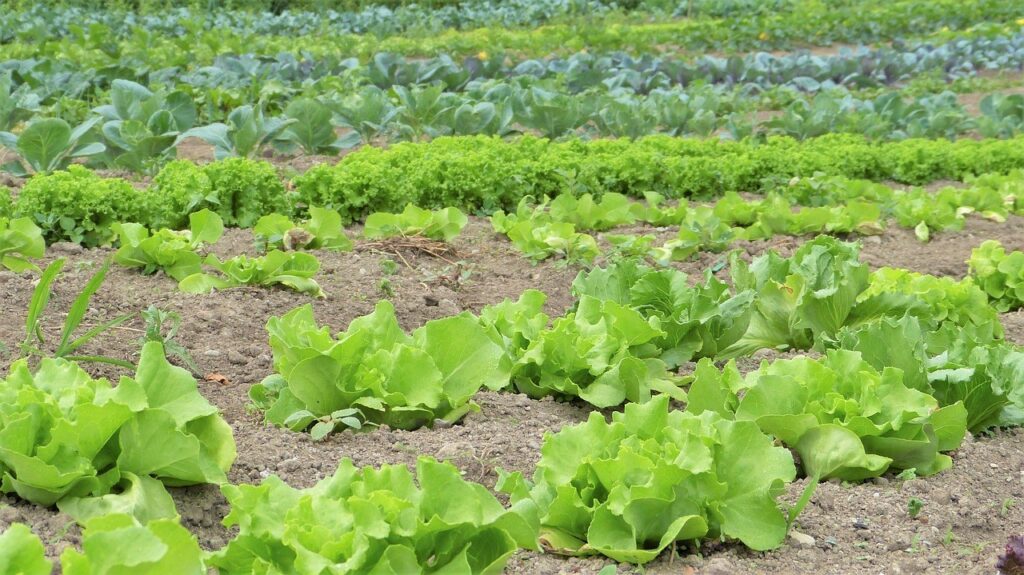Table of Contents

Organic Crop Production: A Comprehensive Guide-Organic crop production has become a significant and growing field within agriculture, driven by increasing consumer demand for sustainable and health-conscious food choices. This blog delves into the essence of organic crop production, exploring its history, principles, methods, benefits, challenges, and future trends. Whether you’re a seasoned farmer or a curious consumer, understanding the nuances of organic farming can provide valuable insights into how our food is grown and the impact it has on our world.
Introduction-
Organic crop production refers to farming practices that focus on cultivating crops without synthetic fertilizers, pesticides, or genetically modified organisms (GMOs). Instead, organic farming emphasizes natural processes and inputs, promoting environmental health and sustainability. This approach not only nurtures the soil but also supports biodiversity, reduces pollution, and fosters a more resilient ecosystem.In recent years, organic farming has gained prominence due to growing awareness about environmental sustainability and health. As consumers become more conscious of what they eat and its origins, organic products have increasingly found their way into mainstream markets, influencing agricultural practices globally.
History and Evolution
Origins-The roots of organic farming can be traced back to traditional agricultural practices that predate modern industrial farming. Early farmers relied on natural compost, crop rotation, and manual pest control methods, long before the advent of synthetic chemicals and GMOs. These time-tested practices formed the foundation of what we now recognize as organic farming.
Modern Organic Movement-The modern organic movement began in the early 20th century as a response to the increasing use of synthetic chemicals and industrial farming methods. Pioneering figures such as Sir Albert Howard, Rudolf Steiner, and William Albrecht advocated for a return to more natural farming practices. Their work laid the groundwork for the development of organic farming principles and methods.In the 1960s and 1970s, the organic movement gained momentum with the establishment of organizations like the Organic Trade Association and the development of organic certification programs. These initiatives helped standardize organic practices and provide consumers with a clear understanding of what constitutes organic agriculture.
Principles of Organic Crop Production
Organic crop production is guided by several core principles that differentiate it from conventional farming practices:
Soil Health-One of the fundamental principles of organic farming is maintaining and improving soil health. Organic farmers use methods such as composting, green manures, and cover cropping to enrich the soil with essential nutrients and organic matter. This approach not only enhances soil fertility but also promotes a healthy microbial ecosystem that supports plant growth.
Biodiversity-Organic farming encourages biodiversity through practices like crop rotation, polyculture, and the promotion of beneficial insects. By diversifying crops and fostering a balanced ecosystem, organic farms can reduce the prevalence of pests and diseases, minimize soil erosion, and improve overall farm resilience. Organic Crop Production
Natural Pest and Disease Management-Rather than relying on synthetic pesticides, organic farmers use natural pest and disease management techniques. Integrated Pest Management (IPM) is a common approach, combining biological controls (such as introducing beneficial insects), cultural practices (like crop rotation), and mechanical controls (such as traps and barriers) to manage pests and diseases effectively.
Avoidance of Synthetic Inputs-Organic farming prohibits the use of synthetic fertilizers, pesticides, and GMOs. Instead, organic farmers use natural and organic inputs to nourish their crops and manage pests. This prohibition helps prevent the buildup of harmful chemicals in the environment and promotes the use of sustainable practices.
Methods and Practices-
Organic crop production involves a range of methods and practices designed to work in harmony with nature. Here are some key techniques used in organic farming:
Soil Preparation-Soil preparation in organic farming focuses on building healthy, fertile soil without the use of synthetic chemicals. Farmers may use practices such as adding compost, manure, or biochar to enhance soil structure and nutrient content. Additionally, techniques like reduced tillage help maintain soil health and prevent erosion. Organic Crop Production
Planting and Cultivation-Organic planting and cultivation methods prioritize sustainability and environmental health. Organic farmers often use techniques such as hand weeding, mulching, and manual harvesting to minimize soil disturbance and reduce the reliance on mechanical equipment. Planting cover crops and practicing crop rotation help maintain soil fertility and prevent pest buildup.
Water Management-Effective water management is crucial in organic farming, where sustainable practices are emphasized. Organic farmers often use methods such as drip irrigation, rainwater harvesting, and soil moisture monitoring to optimize water use and minimize waste. These practices help conserve water resources and reduce the risk of over-irrigation.
Benefits of Organic Crop Production-
Organic crop production offers a range of benefits, including environmental, health, and economic advantages:


Environmental Impact-Organic farming has a positive impact on the environment by reducing pollution, conserving water, and promoting biodiversity. The use of natural inputs and sustainable practices helps prevent soil erosion, protect water sources, and support a diverse range of plant and animal life. Organic farms often serve as havens for wildlife and contribute to the overall health of the ecosystem.
Health Benefits-Consuming organic produce can offer health benefits due to the reduced exposure to synthetic chemicals and GMOs. Organic farming practices aim to minimize pesticide residues and provide food that is free from artificial additives and preservatives. Additionally, organic foods often contain higher levels of certain nutrients, such as antioxidants, which can contribute to better overall health.
Economic Aspects-Organic farming can be economically advantageous for farmers due to higher market prices and premium opportunities. Organic products often command higher prices in the marketplace, reflecting the additional labor and inputs required for organic production. Moreover, organic farming can create new business opportunities and support local economies through direct-to-consumer sales and farmers’ markets.


Challenges and Limitations-
While organic crop production offers numerous benefits, it also comes with its own set of challenges and limitations:
Cost and Labor-Organic farming often requires higher costs and more labor compared to conventional methods. The use of organic inputs, manual labor for weeding and pest control, and the need for ongoing soil management can contribute to increased production costs. Additionally, organic farms may face higher risks of crop loss due to pests and diseases, requiring additional time and resources for management.
Certification and Regulation-Obtaining organic certification involves a rigorous process that requires farmers to adhere to specific standards and practices. Certification organizations evaluate farms based on their compliance with organic regulations, which can include detailed record-keeping, inspections, and adherence to approved inputs and practices. While certification provides credibility and market access, the process can be complex and time-consuming.


Yield and Efficiency-Organic farming may produce lower yields compared to conventional methods, primarily due to the limitations of synthetic inputs and pest management. However, advances in organic farming techniques and technology are helping to improve yield efficiency and reduce gaps between organic and conventional production. Despite this, organic farmers must often balance yield with sustainability and environmental goals.
Innovations and Future Trends-
The field of organic crop production is continuously evolving, with new innovations and trends shaping its future:
Technological Advances-Technological advancements are enhancing organic farming practices and improving efficiency. Innovations such as precision agriculture, organic-compatible pest monitoring systems, and advanced composting techniques are helping organic farmers optimize their practices and increase productivity. These technologies are making it easier to manage crops, monitor soil health, and address pest issues in a sustainable manner.
Consumer Trends-The demand for organic products continues to grow as consumers become more aware of the benefits of organic agriculture. Trends such as increased interest in plant-based diets, local and sustainable food sources, and transparency in food labeling are driving the expansion of organic markets. As consumer preferences shift, organic farming is expected to play a larger role in the global food system.
Policy and Advocacy-Policy and advocacy efforts are crucial in supporting the growth of organic agriculture. Governments and organizations are working to promote organic farming through subsidies, research funding, and supportive policies. Additionally, advocacy groups are raising awareness about the benefits of organic farming and working to address challenges such as certification costs and market access.
How to Start Organic Farming-
If you’re interested in starting your own organic farm, here are some essential steps to consider:
Getting Certified-Obtaining organic certification is a key step in establishing an organic farm. The certification process involves selecting a certifying body, developing an organic system plan, and undergoing inspections to ensure compliance with organic standards. Certification provides credibility and access to organic markets, but it requires careful planning and adherence to regulations.
Choosing Crops-Selecting the right crops for organic farming involves considering factors such as local climate, soil conditions, and market demand. It’s important to choose crops that are well-suited to your region and align with organic practices. Additionally, diversifying your crop selection can help manage pests and diseases and improve soil health.
Resources and Support-Starting an organic farm requires access to resources and support networks. Organizations such as the Organic Trade Association, local agricultural extension services, and online communities can provide valuable information, advice, and resources. Networking with other organic farmers and participating in workshops or training programs can also enhance your knowledge and skills.
Conclusion-Organic crop production represents a holistic approach to farming that prioritizes environmental health, sustainability, and consumer well-being. By understanding the principles, methods, benefits, and challenges of organic farming, we can make informed choices about the food we consume and support practices that contribute to a healthier planet.As the organic movement continues to grow, innovations and trends are shaping the future of agriculture, offering new opportunities and solutions for sustainable food production. Whether you’re a consumer seeking healthier food options or a farmer exploring sustainable practices, organic crop production offers a path toward a more sustainable and resilient food system.